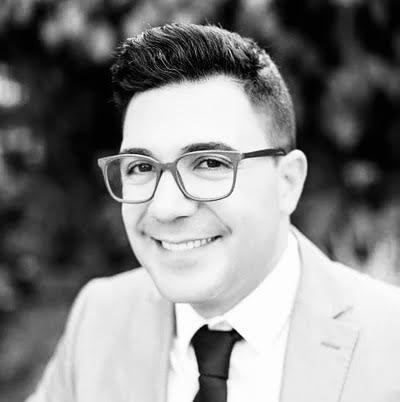The Way Back Devotional: Some Thoughts on Forgiveness
By Zaher Alajlani (with a forward by Kimberly Phinney)
“…Forgiveness and compassion are always linked: how do we hold people accountable for wrongdoing and yet at the same time remain in touch with their humanity enough to believe in their capacity to be transformed?”
—bell hooks, in conversation with Dr. Maya Angelou
In his last book Forgive, the late Dr. Timothy Keller quoted Desmond Tutu’s famous decree on forgiveness: “Without forgiveness there is no future.” And in that simple phrase, Dr. Keller commences on a profound argument that our country today should not only busy itself in justice but also in the pursuit of relearning forgiveness. For Keller, like Christ, there is no way through without forgiveness.
Yes, this hits a nerve, doesn’t it? It seems that today, we are all too good at shouting down our enemies. We are all too good at Tweeting our rage or sporting an exclamatory bumper sticker. We are all too good at retreating into enclaves of shared thoughts or identities to ensure we will never have to engage with those we don’t agree with or who don’t look like us. In our search for a hard justice or canceling one another, we have forgotten the gentler, more essential path.
We have forgotten how to forgive. And in that “fading of forgiveness,” as Dr. Keller calls it, we have forgotten brotherly love.
In his moving and thoughtful devotional, TWBTO contributor Dr. Zaher Alajlani meditates on the vital significance forgiveness must still play in our spiritual and emotional lives. Perhaps in our search for power and justice, we have forgotten the way back to the POWER of forgiveness.
And I wonder, what would our world look like if we all chose to see each other a little bit more, to bear in our burdens together, and to extend an olive branch instead of an iron fist?
I am convinced that nothing is closer to the HEART OF GOD than to see ALL of his children living in unity with one another. Forgiveness is the way back. And I want to live in a world like that.
O N F O R G I V E N E S S
by Dr. Zaher Alajlani
“And be kind to one another, tenderhearted, forgiving one another, even as God in Christ forgave you.”
(Ephesians 4:32, NKJV)
We tend to think of forgiveness as an act of interpersonal interaction: If someone mistreats you, it is better to let go and forgive them. That is great, really great. However, it doesn’t go far. Earthly life, despite the occasional happiness, is full of injustice. No matter how happy we may be now, life will eventually pour suffering into our existence like acid down someone’s throat. Misery, confusion, and bitterness will follow.
Sin is inevitable. We shall sin against God, our families and friends, and ourselves. This is not a deterministic view of human nature. Far from it, the Lord has given us free will, which we all misuse by sinning. Yet, no matter how big our capacity for evil is, there is still a greater evil in the larger world, where there’s pain, disease, war, famine, and death.
The latter inspires existential terror within. Even if one is not afraid of dying or utterly convinced that there is no afterlife but only peaceful oblivion, there is still that awful sense of waste that makes us all shudder as we try to comprehend death. Arthur Schopenhauer captures the significance of death in our lives:
Death is the true inspiring genius or the muse of philosophy . . . Indeed without death men would scarcely philosophize.
To expire as though one never existed is perhaps the last wound the world inflicts upon someone, but it is not the last for those who loved them. No man or woman, no matter how unpleasant, doesn’t have someone who loves them. The cycle of suffering and sadness is bound to continue.
How does one deal with all of that? Through all-encompassing forgiveness, one where man forgives man, man forgives himself, man forgives the world, and God forgives man. Forgiveness here is deliberate and contemplated. One must forgive themselves, then repent. One must forgive others because no one is without fault. One must forgive the world because Christ came to redeem it. One must forgive to deserve God’s forgiveness.
Ephesians 4:32 perfectly illustrates this act of cosmic mercy. The same forgiveness we extend to ourselves we must extend to each other and the larger world. This, however, doesn’t mean we should excuse evil or turn a blind eye to cruelty. Quite the opposite, a faithful follower of Christ must always mitigate suffering and condemn violence.
Also, this cosmic forgiveness remains very different from the stoic view that one can attain happiness and inner peace by accepting suffering gracefully. While this idea is beautiful, it still dehumanizes us because it is not in our nature not to resist pain, not to cry out against it. Even Christ, the divine Messiah, says on the Cross, “My God, My God, why have You forsaken Me?” (Mathew 27:46, NKJV). Although Jesus’s statement here is a reference to Old Testament theological notions and prophecies, one can still benefit from its symbolic dimension. Jesus feels our pain when we sometimes feel abandoned.
That’s why he is a God of love: He knows us, and His inspired Word heals us. Forgiveness and kindness allow us to navigate this world without self-destructing, without being bitter, and without spite.
Like God’s Love, our capacity to stumble and repent is boundless. As long as we live, we must forgive—over and over again. And to walk down this challenging yet beautiful path, we must never forget that “God in Christ” has forgiven us. The least we can do is to extend the same to others.
“To forgive is to set a prisoner free and discover the prisoner was YOU.”
—L E W I S B. S M E D E S, T H E O L O G I A N
Forgive: Why Should I and How Can I?
by Dr. Timothy Keller
Forgiving anyone in a meaningful way is one of the hardest things a person has to do. If you do not, resentment and vengeance begin to consume you. It is nearly impossible to move past transgression without forgiveness, but few people have the resources and the tools to forgive others fully and move on with their lives. Forgiveness is an essential skill, a moral imperative, and a religious belief that cuts right to the core of what it means to be human. In Forgive, Timothy Keller shows readers why it is so important and how to do it, explaining in detail the steps you need to take in order to move on without sacrificing justice or your humanity.
—from www.TimothyKeller.com
ZAHER ALAJLANI
Zaher Alajlani is a Pushcart-nominated Syrian short-story author, editor, researcher, and translator living between Romania and Greece. His work has been featured in various publications, including Agape Review, Ariel Chart, Bandit Fiction, Active Muse, Altered Reality, Revista Echinox, The Way Back to Ourselves, and The Journal of Romanian Literary Studies. In addition to contributing to The Way Back to Ourselves, he is a prose editor for Agape Review and a proofreader for Metacritic Journal for Comparative Studies and Theory. Zaher has a Ph.D. from the Comparative Literature Department of Babes-Bolyai University of Cluj-Napoca. His research focuses on early modern horror fiction, the relationship between science and religion, morality and meaning, and the 19th-century mad scientist prototype. He speaks English, Arabic, Romanian, and Greek. Zaher is a member of the Panhellenic Association of Translators and the Association of Fiction Creators in Romania.



